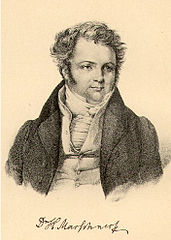Heinrich Marschner
 Heinrich Marschner, litografia na podstawie rysunku F.A. Junga, ok. 1830 | |
| Imię i nazwisko |
Heinrich August Marschner |
|---|---|
| Data i miejsce urodzenia | |
| Pochodzenie | |
| Data i miejsce śmierci | |
| Gatunki | |
| Zawód | |
| Odznaczenia | |
Heinrich August Marschner (ur. 16 sierpnia 1795 w Żytawie, zm. 16 grudnia 1861 w Hanowerze) – niemiecki kompozytor romantyczny, twórca oper.
Debiutował w 1810 baletem Dumna wieśniaczka. Studiował prawo w Lipsku, w 1823 został dyrektorem muzyki w Dreźnie a w latach 1831–1859 kapelmistrzem Hoftheater w Hanowerze. W 1820 w Dreźnie – dzięki protekcji Carla Marii von Webera – wystawiono operę Marschnera pt. Heinrich IV und d'Aubigné. Po śmierci Webera nie udało się Marschnerowi zostać jego następcą na stanowisku dyrektora opery drezdeńskiej. W 1826 Marschner opuścił Drezno i wyruszył do Lipska, a później do Hanoweru. Zyskał sławę dzięki pełnym demonicznych i niesamowitych nastrojów operom, wśród których popularność zdobyły Wampir (Der Vampyr) (1828) oraz Hans Heiling (1833).
Odznaczony bawarskim Orderem Maksymiliana (1853)[1].
Opery
[edytuj | edytuj kod]- Titus (1817)
- Der Kiffhäuser Berg (1817)
- Saidar und Zulima (1818)
- Heinrich IV und d'Aubigné (1819)
- Der Holzdieb (1825)
- Lukretia (1827) (Op. 67)
- Wampir (1828)
- Der Templer und die Jüdin (1829)
- Des Falkners Braut (1830) (Op. 65)
- Hans Heiling (1833)
- Der Bäbu (1838)
- Das Stille Volk
- Ali Baba
- Der Wiener in Berlin
- Fridthjof's Saga
- Kaiser Adolf von Nassau (1844) (Op. 130)
- Austin (1852)
Przypisy
[edytuj | edytuj kod]- ↑ „Zeitschrift für Bayerische Landesgeschichte”. Band 47 (Heft 1), s. 398, 1984. München.
Linki zewnętrzne
[edytuj | edytuj kod]- Heinrich Marschner – twórczość tego autora dostępna w bibliotece cyfrowej International Music Score Library Project
- Heinrich August Marschner w bazie AllMusic (ang.)
- Nuty Heinricha Marschnera w bibliotece Polona
- ISNI: 0000000121334972
- VIAF: 54183923
- LCCN: n82225838
- GND: 11878210X
- NDL: 01205272
- LIBRIS: khw03wc331dgnjx
- BnF: 121404116
- SUDOC: 080200648
- SBN: LO1V186348
- NLA: 36011161
- NKC: ola2002146835
- BNE: XX1017939
- NTA: 070812276
- BIBSYS: 3016106
- CiNii: DA12248105
- Open Library: OL4802013A
- PLWABN: 9810605642705606
- NUKAT: n2003063525
- J9U: 987007265046105171
- PTBNP: 1317911
- CANTIC: a11433619
- LNB: 000043116
- NSK: 000060828
- CONOR: 74971491
- RISM: people/79853
Text is available under the CC BY-SA 4.0 license; additional terms may apply.
Images, videos and audio are available under their respective licenses.
